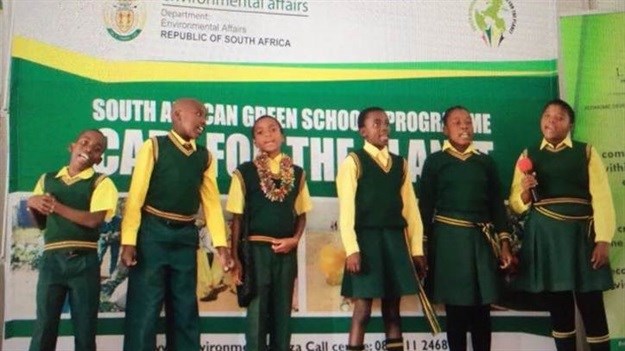South African Green Schools Programme launches
The inaugural South African Green Schools Programme (SAGSP) was launched in Polokwane on 25 April 2017 as a pilot project between the Department of Environmental Affairs (DEA) and the Limpopo Economic Development, Environment and Tourism (LEDET).
Awards to environmentally conscious schools
The Deputy Minister of Environmental Affairs, Barbara Thomson, the Limpopo MEC for Economic Development, Environment and Tourism, Seaparo Sekoati and the MEC for Education, Ishmael Kgatjepe officially launched the pilot project and awarded prizes to schools with winning environmental projects.
Learners from 105 schools in and around Limpopo province displayed their projects that focus on environmental conservation. Schools with outstanding projects were awarded prizes ranging from R35,000 to R100,000. These funds will be channelled towards small-scale projects that support meaningful learners’ action on environmental issues in their respective schools. The winning schools are as follows:
| Name of School | Name of Award and amount | | Intermediate Phase (Grade 6) |
| Mosasane Baloyi Primary School | Rhino Award – R100,000 |
| Rethusitswe Primary School | Renewable Energy Award - R 75,000 |
| Ramaahlo Primary School | Blue-Crane Award – R50,000 |
| Sudzulusani Primary School | Baobab Award – R40,000 |
| Dikgabje Primary School | Lake Fundudzi Award – R35,000 |
| Senior Phase (Grade 9) |
| Mopane Intermediate School | Rhino Award – R100,000 |
| Pax College | Renewable Energy Award - R 75,000 |
| Phutikwe Combined School | Blue-Crane Award – R50,000 |
| Lepono High School | Baobab Award – R40,000 |
| Sekoba Secondary School | Lake Fundudzi Award – R35,000 |
Six themes
The pilot project aims to raise awareness to learners to the problem of environmental degradation which can be reversed through educating the nation and adopting sustainable measures of harvesting environmental resources with a view to create a legacy the future generations can inherit.
The SAGSP initiative is comprised of six thematic areas:
- Waste management - to promote waste hierarchy (reduce, reuse and recycle) and waste management projects;
- Energy efficiency & conservation - to promote energy awareness, audits and energy saving strategy;
- Water management and conservation - to promote planning and optimum utilisation of water resources eg rainwater harvesting, water usage audits, irrigation methods;
- Landscaping, tree planting and beautification - to contribute to carbon offsetting and beauty of the school;
- Public participation and community empowerment - to instil sense of environmental responsibility in communities (knowledge and skills);
- Leadership and institutional arrangements - to develop school environmental policy, vision, mission, strategies and plans to achieve greening projects and awareness
Today’s children are tomorrow’s decision makers and they need to be equipped with the knowledge of intricacies of the workings of the environment, which gives all biological beings their livelihood. Unfortunately, many children have few opportunities to experience nature. Excitement about nature and caring for environment should be modelled to children to instil enthusiasm.
Environmental education based on life experiences should begin during the very earliest years of life. Beginning this process in the early years, when attitudes toward the world around them are forming, is essential. Such experiences play a critical role in shaping lifelong attitudes, values and patterns of behavior toward natural environments. Children's attitudes toward living things develop at a young age and they will imitate the attitudes and actions toward caring for the environment that is modelled for them.
Speaking at the launch, Deputy Minister Thomson encouraged the school leaners to become ambassadors for the environment for the sake of the current and future generations. “The care for and protection of our environment has to start at a young age and I would like to express my thanks to everyone involved in taking this proactive step to nurture in our younger generation an appreciation of the importance of environmental care and protection.”













































